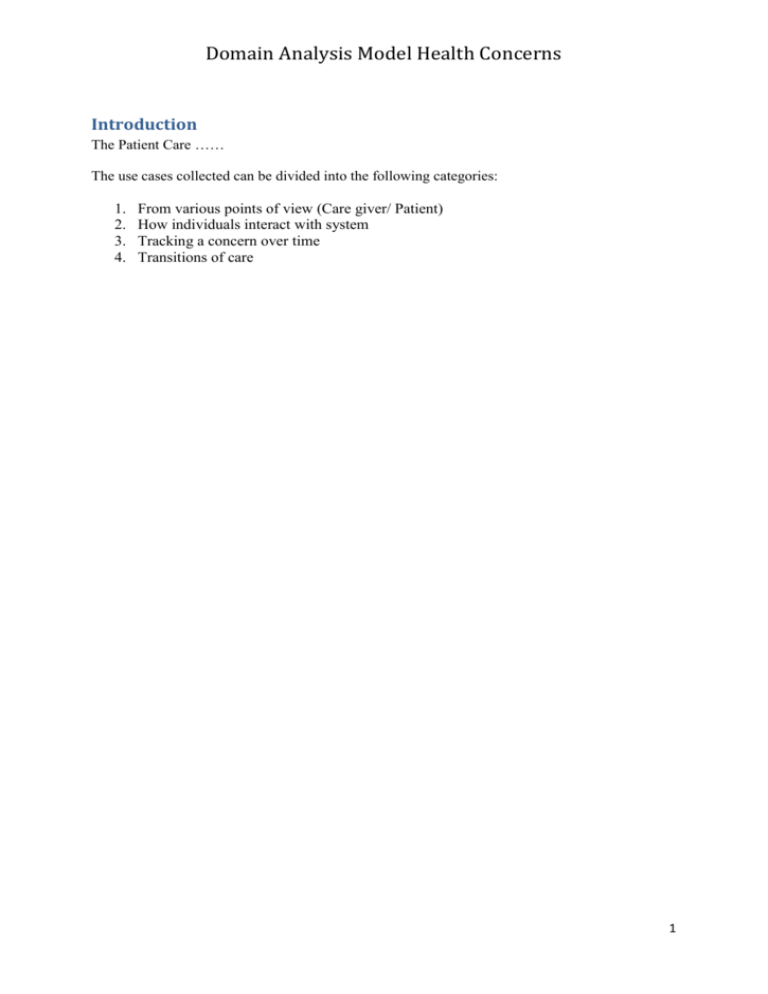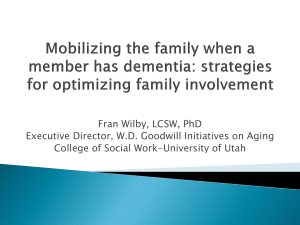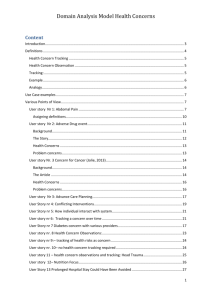Health Concern Tracking
advertisement

Domain Analysis Model Health Concerns Introduction The Patient Care …… The use cases collected can be divided into the following categories: 1. 2. 3. 4. From various points of view (Care giver/ Patient) How individuals interact with system Tracking a concern over time Transitions of care 1 Domain Analysis Model Health Concerns 2 Key concepts: 1. Health concern observation: riscs, problems, diagnosis, issues over time. 2. Health concern tracking Various Points of View User story Nr 1: Advance Care Planning My Dad is 87 years old. He has Vascular Dementia, Congestive Heart Failure, High Blood Pressure, High Cholesterol, Hypertension and Glaucoma. He lived with me for a year and a half after his care became too much for my 86 year-old mother. After an elopement issue where he wondered across the street in the middle of a cold night, the family agreed it would be best for him to move to a facility that specialized in caring for patients with memory loss issues. Last year he had a bad case of Pneumonia and we nearly lost him. He spent 7 days in the ICU, 5 days in a step-down unit, and then two weeks in a rehabilitation facility. During this episode, the whole family became acutely aware that the time for Dad’s eventual departure could be coming in the not too distant future. We all came to terms with it, even Dad. Last Sunday, our minister preached a great sermon titled, “What will be engraved on your headstone?” The readings talked about how Paul did not fear death when he knew his life was coming to an end. The message explained how Paul was able to feel resolved at the time when he realized his life was coming to an end, knowing he had been a “good and faithful servant” and had “run a good race”. After church we sat down as a family over lunch. We talked about the things that were important to us, as we each considered the end of our lives. Dad shared that he was concerned about becoming a burden on his family. He didn’t want to ever be a financial burden, or a time burden. He was concerned about how much all his care was costing, and how much effort it took to take care of him. He said that in the future, should something happen where he was “dead, but not really dead”, and the doctors said there was little chance of any real recovery from this condition, he did not want us to keep him alive with medical machinery or feeding tubes which would prolonged that sort of life. He asked that we record his wishes not to have CPR performed. He said that if it was possible, and not too much of a burden on us, that he would prefer to die at home, in the company of his family, rather than in a hospital. He also added that after he had gone, since he would no longer need them, he would like to donate any of his organs which could be of use to others. I recorded all of his concerns, and wrote down his instructions about where he wanted to be buried and his wishes regarding funeral arrangements. A few tears were shed, and the conversation was really heartfelt and genuine. I was so glad to know what Dad thought and how he felt about all this. It made me feel more at ease knowing that the whole family knew what was important to Dad and that if the time ever came when I needed to do my duty as his healthcare power of attorney, I would know in my heart what Dad wanted me to do. 2 Domain Analysis Model Health Concerns 3 Domain Analysis Model Health Concerns User Story nr 2: Conflicting Interventions My Father is 87 years old. He lives in a Memory Care Center because he has vascular dementia. He also has congestive heart failure, has had quadruple by-pass surgery (in 2007), and now has a pace maker (in 2011). I am his legal guardian and his healthcare power of attorney. Dad has very bad back pain. It keeps him from moving around much, and consequently he spends a lot of time sitting in his room by himself. This is not good for his quality of life. He is much happier when he is up and about and participating in activities with other residents. His PCP prescribed Celebrex for his back pain. After taking this medication for four weeks, he was getting noticeable relief and was spending more time walking outside of his room and partaking in activities. At his 6month check-up with his Cardiologist, the Celebrex was discontinued due to concomitant risks of use. Dad takes Warfarin, so the Cardiologist was concerned the Celebrex could increase Dad’s risk of bleeding complications. The Cardiologist was also concerned that the Celebrex could decrease the effectiveness of the ACE Inhibitor medication that Dad takes. When the nurses at the Memory Center got the order to discontinue Celebrex, they destroyed the remaining 2-month’s supply of the medication. (Dad’s insurance company requires that all medications are filled via mail-order with a 3-month’s supply.) At the 6-week follow-up visit with his PCP, Dad said his back was feeling better for a while and he was happy about doing a few more activities, but explained that lately he was feeling more pain again. The PCP explained the risks to me (I take Dad to all his appointments). We agreed that concerns about Dad’s pain and low enjoyment of life, outweighed the concerns about the risks associated with the potential complications. The PCP provided orders for Dad to go back on the Celebrex. The nurses at the Memory Care Center ordered another 3-month’s supply. Two weeks later, when the Cardiologist reviewed Dad’s medical record to check on the recent lab results and INR levels, he noticed that Dad’s medication list included Celebrex and he ordered it to be discontinued. The nurses destroyed the supply of Celebrex a second time. A week later when I came to visit, Dad’s back was really bothering him. I checked his medication log and noticed that he was not being given any Celebrex. I asked the nurses why and they told me the Celebrex order had been discontinued. I’m concerned. I don’t know how to communicate effectively about our choices regarding these trade-offs. I need a way to explain to the whole care team our decision to accept the risks associated with taking this medication, so that Dad’s life can be more enjoyable, even if that means it might be shorter. What point is there for Dad to live longer, if he can’t engage in activities and be free from pain? I am concerned about how to resolve the doctor’s conflicting points of view. I am also concerned about the cost of the medications that are being wasted. 4 Domain Analysis Model Health Concerns How individual interact with system 5 Domain Analysis Model Health Concerns Tracking a concern over time User Story nr 5 Diabetes concern with various providers Chubby Chuck has always had a good appetite for fast food. His weight has always been a problem and a reason for teasing, but Chuck is a cheerful fellow who manages to survive through hard times. He does not like to exercise, because he is ashamed to hoist his flabby waistline in a flashy sport suit. The office where he works has recently moved into a two story building with no elevators. One day while he had to climb the stairs he tried to catch his breath, but instead he saw stars and fainted. His manager helped him to recover and advised him to consult his doctor. Chuck made an appointment with his GP for the next morning . Doctor Robert Pill has been the family doctor since his childhood, but had not seen Chuck for many years. Dr. Pill was surprised that Chuck had gained so much weight and decided to carry out a thorough medical checkup with Chuck. Analysis of his blood showed that Chuck had a glucose level of 13 mmol/l. Chuck is diagnosed with Diabetes type 2. Dr Pill registers his findings in the medical records of his system and prescribes insulin. But besides the medication Dr. Pill advised Chuck to follow a diet and start exercising. Dr. Pill sends the prescription electronically and a concern-id as a tag to the prescription. Chuck visited a dietitian in the same healthcare center and Mrs. Agatha Breadcrumb and read the referral that Dr. Pill had sent along to Mrs. Breadcrumb. Mrs. Breadcrumb explained to Chuck what kind of food he should omit and advised him on the diet he should follow. She noted down her findings in her system using the same concern-id as a tag to her records of Chuck. 6 Domain Analysis Model Health Concerns User story nr. 6 Health Concern Observations: A 48 year-old male patient was seen by a primary care provider (PCP) on 20 June 2012. Health concern observation: presenting signs and symptoms: He presented to the PCP with complaints of lethargy, polydipsia, polyuria, difficulty in concentration, and recent weight loss. Spot blood glucose level revealed a reading of 11mmol/litre. Patient has no family history of Type 1 or Type 2 Diabetes Mellitus Health concern observation: problem/diagnosis Patient’s spot blood pressure was 156/90 (hypertensive) . Body weight was 88 kg, height 170cm, BMI = 30.4 (obese) Based on medical history and physical assessment, the GP made a provisional diagnosis of type 2 diabetes mellitus The GP requested fasting blood glucose and glucose challenge, HbA1C, serum lipid profile tests Patient was seen again by his GP on 25 June to discuss the test results. The GP made a diagnosis of Type 2 diabetes taking into consideration clinical history, physical examination and diagnostic test results. Health concern observation: presenting signs and symptoms: On 30 June, patient presented at the ED of his local hospital with the following presenting signs and symptoms: fever, productive cough, dyspnoea for 3 days, severe thirst, muscle weakness and increasing lethargy since onset of respiratory symptoms, warm dry skin, dry oral mucosa, blurred vision, , and mental confusion. Health concern observation: problem/diagnosis Diagnostic tests showed: chest x-ray lateral view showed lobar pneumonia left lower lobe, spot blood glucose level 30 mmol/L, serum osmolality = 325 mOsm/kg, serum pH = 7.40. Based on the clinical history, presentation and diagnostic tests The treating physician diagnosed the patient to be suffering from hyperosmolar hyperglycemic nonketotic syndrome. The patient was treated in the hospital and discharged back to the care of his PCP. An electronic discharge summary was sent to the PCP Health Concern Tracking: From June 2012, the health concern tracker application of the PCP medical record system continues to track the patient’s diabetes problem and related issues: Presenting signs, symptoms, clinical evaluation at each encounter/visit Risks for complications: cardiovascular, neurological, renal, ophthalmic, etc Prognosis of the condition 7 Domain Analysis Model Health Concerns User story nr 7:– tracking of health risks as concern Health Concern (Risk Factor) observation: A male patient has the following health profile: High BMI: 31.2 High blood pressure: 14 days average >157/93 Smoking: 15 pack year (1.5 pack/day for 10 years) Elevated lipid profile (including high LDL and LDL:HDL ratio) Cardiovascular risk (based on Framingham Risk Equation) and stroke risk are assessed to be high Health Concern Tracking: The risk of atherosclerotic heart disease and stroke associated with this patient’s risk factors are considered immediate health risks. The health risk factors as health concerns are continuously tracked by the PCP medical record system health concern tracking application ------------------------------------------------------------------------------------------------------------------------- User story nr. 9– no health concern tracking required Health Concern (family history related risk factor) Observation: A 35-year old female patient has a family history of breast cancer in three first degree female relatives. The patient is recently diagnosed with aggressive malignant brain tumour. Prognosis of brain tumour is assessed by neurologist to be very poor Health Concern Tracking: The risk of breast cancer as a health concern will not be considered in her case. Health concern tracking of breast cancer risk will not be initiated 8







